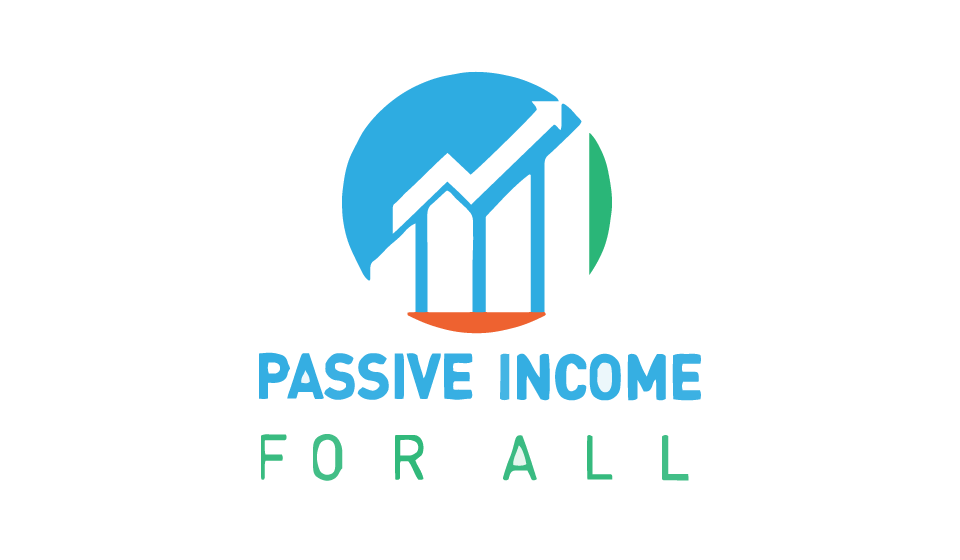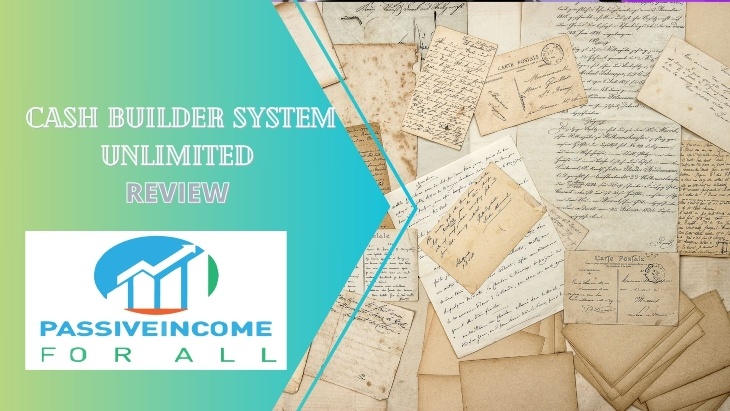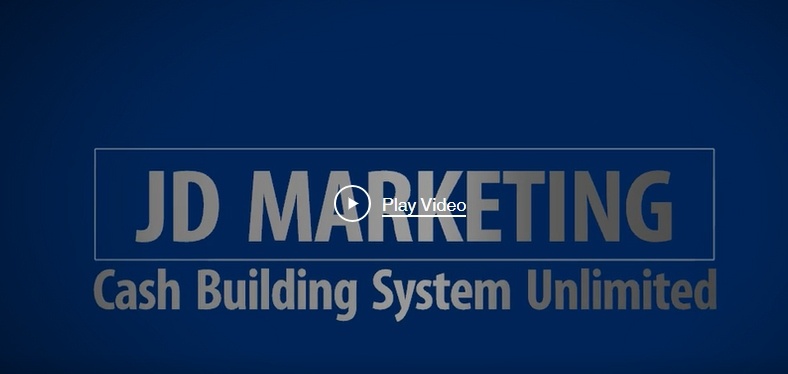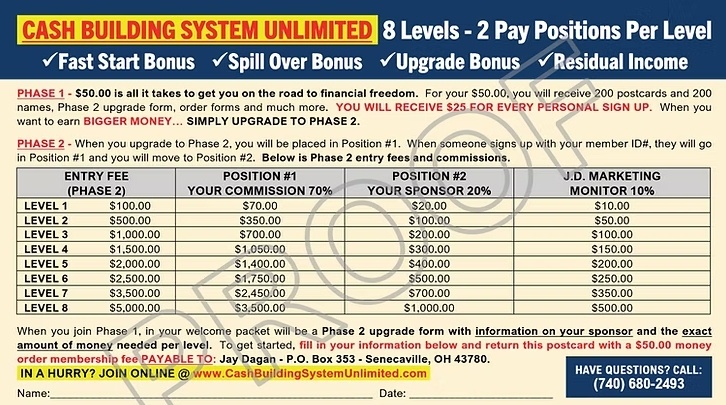Can mailing postcards make you money?
That’s the big question that pops up whenever someone mentions (CBSU), an old-school direct mail system that claims you can build a stream of income just by dropping postcards in mailboxes around the country.
I know the idea sounds simple enough, but is CBSU a way to make money from home, or are you just throwing away cash?
Here’s my review of CBSU, a deep dive based on my research, and a no-nonsense look at whether this so-called “postcard MLM” is worth your time or if it’s another high-pressure scheme dressed up as a business opportunity.

- What Is Cash Building System Unlimited (CBSU)?
- How CBSU Claims to Work
- CBSU Compensation & Upgrade Structure
- Red Flags and Concerns
- Is CBSU a Pyramid Scheme?
- Who Is CBSU For?
- CBSU’s Reach: Is It Active in South Africa or Globally?
- CBSU(Cash Builder System Unlimited) vs Legitimate Online Business Models
- Pros and Cons of CBSU
- My Final Verdict: Should You Join CBSU(Cash Builder System Unlimited)?
- Ready to Build Real Income? Here’s How To Get Started…

What Is Cash Building System Unlimited (CBSU)?
CBSU is a direct mail moneymaking program run by J.D. Marketing, a company owned by Jay Dagan and based out of Ohio, USA.
If you do a J.D. Marketing review, you’ll see this isn’t their first postcard program. Jay’s been doing this kind of thing for quite a while, with a long trail of similar business opportunities that always seem to revolve around sending out simple physical mailers.
The whole pitch of CBSU goes like this: you sign up, receive a starter kit full of postcards and fresh mailing leads, and then you mail those postcards to people across the country.
Each card has your unique ID, and when someone joins using your code, you earn cash, sometimes via check, sometimes via direct deposit. CBSU doesn’t offer any real products or services.
It’s all about recruiting others by convincing them to buy their starter kits, then repeating the cycle.
CBSU’s marketing material always makes it sound pretty easy. You don’t need experience, tech skills, or sales expertise. They say anyone can do it, which is probably the main thing drawing people in.
It’s supposed to be quick, straightforward, and offline, which can appeal to those not comfortable with the digital world.
Even though it sounds simple, it’s worth looking closer since similar postcard schemes have popped up in the past and have left people out of pocket. The old-fashioned look may feel low risk, but as with any money-making program, risks are always part of the game.
How CBSU Claims to Work
The basics of how CBSU says you make money are super simple.
You pay $50 for a Level 1 starter kit, your upfront investment. For that price, here’s what you get as a new member:
- A stack of preprinted marketing postcards
- Direct mail leads (real names and addresses of people supposedly interested in “business opportunities”)
- Your own personal CBSU ID number
- Instructions on how to address, stamp, and mail your postcards
You stick stamps on these postcards, send them to the leads, and hope a few folks are interested enough to call in or visit the website on the card.
If someone responds and pays for their own $50 starter kit (using your ID), you earn a commission. That’s the whole cycle.
But that isn’t where it ends.
Once you’re in at Level 1, you’re offered additional options to “upgrade.” There are more expensive membership levels: $100, $200, all the way up to $5,000 or more.
Upgrading unlocks bigger commissions, since you can only earn on people who join at the same or lower level than you. To make more money, you’re encouraged to move up, putting in more cash for bigger supposed payouts as you recruit.
While some may find the idea of mailing out physical cards nostalgic or less intimidating than online promotion, the fact remains that everything hinges on constant recruiting. If you’re not bringing in new members, you’re not seeing returns. There’s no alternative source of income within CBSU.
CBSU Compensation & Upgrade Structure
The real substance of the program is its multilevel “upgrade” ladder.
On paper, the logic seems simple: pay more upfront, and you’re eligible for bigger commissions on whoever you recruit (provided they join at your level or lower).
Here’s a summary of how it’s structured:
- Level 1: $50 gets you in the door—starter kit, personal ID, and a shot at $25 commissions per new Level 1 recruit.
- Level 2: $100 is the next step. Now you can earn commissions on both Levels 1 and 2. Each higher “phase” costs more—$200, $500, $1,000, $1,500, $2,000, $2,500, up to $5,000 or higher.
- If you recruit someone who joins at a level lower than yours, you get paid; if they join at a higher level, you only get credit up to your current level, and the rest goes to your “upline.”
That’s classic multi-level marketing: it’s all about recruiting, not selling anything real. There’s a big pressure to keep upgrading, with repeated reminders that you’ll “lose out” on commissions if your recruits buy in at a higher level than you.
One crucial point is straight from CBSU’s documentation: you only earn commission on the levels you’ve paid for yourself.
If most folks stick to Level 1, your earning ability stays low unless you put in serious cash and seriously ramp up your recruiting. It can stack up into thousands of dollars invested just to “unlock” higher commission tiers. There’s no selling involved, only getting more people to do the same thing you did.
Red Flags and Concerns
After reading countless CBSU scam complaints and looking into postcard MLM reviews, certain issues keep coming up.
Here’s what I noticed while researching and reviewing CBSU:
- No real products or services are ever actually sold to the public. The “starter kit” and upgrades are the only things you’re buying.
- The entire income stream comes from recruitment—money paid by new members for the right to recruit even more people. This matches how most pyramid schemes run.
- Other, nearly identical programs run by similar marketers have ended up in legal trouble, flagged for potential mail fraud or operating an illegal pyramid.
- The upsell pressure is intense. With every upgrade, they promise higher earnings and push you to buy in.
- There’s a total lack of income disclosures, success stories, or real earnings stats. No way to check how many people make money versus how many just lose cash on stamps.
- Support appears limited. Many users mention delayed responses or no refund when requested.
Even if you try to dig up a 100% honest cash building system unlimited review, you’ll find lots of red flags and not much transparency from the company itself.
Is CBSU a Pyramid Scheme?
The big question: does CBSU cross into illegal territory?
Here’s what the FTC says about pyramid schemes: they’re illegal when profits are based mainly on recruiting others rather than selling products or services to actual customers. With CBSU, there’s no outside product at all. Just the starter kits and upgrades, sold back and forth between participants.
The FTC offers warning signs for pyramid schemes, and CBSU ticks quite a few boxes. If everyone makes money only by bringing in new participants, that model isn’t sustainable or legal.
These programs can collapse quickly if new recruits dry up, and since each new person is fighting for the same pool of opportunity seekers, that’s bound to happen. If law enforcement or regulators get involved, participants often lose the money they put in, and a few high-level recruiters walk away with any profits.
Getting caught up in a deal that crosses the legal line can mean more than just lost money. You put your banking and reputation at risk.
No amount of “but I thought it was legit” will protect you if an investigation starts looking at your income stream, especially when there’s paperwork showing you made money off of recruiting alone.
Pyramid schemes rarely last long term.
Most promoters will move on to the next project or rebrand the concept, leaving ordinary members to chase their losses or try to recoup their investment elsewhere. Go ahead and check out my number one recommendation to making money online with a unique beginner friendly ecosystem.
Who Is CBSU For?
CBSU often targets people who feel shut out of the digital world—folks looking for offline, paper-and-pen side hustles that don’t require computers, tech skills, or a big online presence.
Its simple approach also appeals to those who may be struggling to find work, are desperate for extra cash, or have tried other make-money-from-home programs unsuccessfully.
For people who understand direct mail or have experience with recruiting, it might seem tempting, especially if you think you can build a large team quickly. But the harsh reality is that most recruits lose money while a few at the top might profit.
Even longtime “offline recruiting” fans usually end up shelling out hundreds on stamps without ever seeing a serious return. Some seasoned marketers might claim to do well, but the cycle depends on constantly adding new people to keep the money flowing.
If all you want is a simple home business, CBSU looks inviting.
But anyone expecting this system to replace a real job or build long-term wealth is likely in for disappointment. The risks, lack of product, and recruiting-only model can drain your wallet faster than you expect.
In fact, these days, even if you are someone who is intimidated by starting an online business, there are various models that are beginner-friendly and offer step-by-step training to build a sustainable online business. Check out my number one recommendation here.
CBSU’s Reach: Is It Active in South Africa or Globally?
CBSU is based in the United States, and there’s no mention of an official presence anywhere outside the US.
You won’t find local offices, accredited branches in other countries, or any compliance with rules in places like South Africa.
Despite this, I’ve seen international participants get pitched by CBSU promoters online. They’re usually lured in through social media, classifieds, or WhatsApp groups. That means if you’re overseas and something goes wrong, you’re on your own. There’s no real recourse, no way to chase a refund, and zero legal protection if the scheme collapses.
This is an even riskier play for anyone outside the US.
With an American address required for payments and physical materials needing to be mailed, international members face higher postage costs and slower communication.
That’s important to keep in mind if you’re reading this from somewhere other than the United States.
CBSU(Cash Builder System Unlimited) vs Legitimate Online Business Models
The CBSU model is very different from real, sustainable online businesses that sell products or services people want.
Here’s how CBSU stacks up against proven ways to make money, like affiliate marketing, blogging, freelancing, or print-on-demand:
- Blogging/SEO: You create helpful articles or guides online, bringing in website traffic and making income from ads, partner programs, or digital courses.
- Print on Demand: You launch a store where custom designs are printed as people order. Real value changes hands, and there’s no pressure to recruit anyone.
- Freelancing: You get paid for your skills: writing, editing, graphics, programming, or other services. You deliver results to real clients worldwide.
These models rely on sales or value creation, not recruitment. The best part: you own your business long-term, and you’re not dependent on waves of new joins. If you want to completely avoid recruitment systems, I recommend checking out a platform like Master Affiliate Profits.
You get real training, a support community, and a decent shot at building something solid over time.
If you want to make money online in a sustainable way, focus on models that let you grow skills and build assets, rather than chasing hype-based recruiting systems.
Almost all successful online business owners will tell you: slow and steady wins in the long run, and real value always outlasts empty promises.
Pros and Cons of CBSU
- Pros:
- Simple, offline concept—just mail postcards, follow up if someone joins.
- Low upfront cost to get started ($50 for Level 1).
- Cons:
- No actual products or services provided.
- All income depends on recruiting others.
- Potential legal risk if the scheme is flagged as a pyramid.
- Very high pressure to upgrade for bigger commissions.
- No transparency about refund policies or outcomes.
My Final Verdict: Should You Join CBSU(Cash Builder System Unlimited)?
Based on everything I’ve found: my experience with similar systems, countless other cash building system unlimited reviews, and common sense, I don’t recommend getting started with CBSU.
Programs like this usually end up draining your savings while waving “easy money” and big commissions in your face. When there’s no product and no real value, the deck is stacked against you. The risk of losing your investment is just too high for most people.
Mailing postcards can sound old-school and friendly, but there’s very little chance it’ll help you make money from home long-term.
Legal risk is real, and once recruitment slows down, almost everyone loses. You’re much better off putting your time, energy, and money toward a business model that involves creating actual value, like building a blog, starting an affiliate marketing site, freelancing, or even learning digital marketing from scratch.
There are many proven ways to make money online that don’t depend on recruiting others or buying expensive upgrades for the “privilege” of making commissions.
If you’re serious about changing your financial future, the best thing you can do is look for opportunities that help you grow real skills, tap into genuine demand, and build something lasting for yourself and your family.
Ready to Build Real Income? Here’s How To Get Started…
If you want to go beyond schemes that rely on endless recruitment and earn online, I’ve put together a free resource just for you: “The Four Simple STEPS To Make Money Online.”
Inside, you’ll learn about simple, legit ways real people are making money from home—no “postcard recruiting” required.
Feel free to ask your questions or share your CBSU experiences below. I always enjoy helping fellow readers avoid money traps and find success. Want to get started on a trusted, proven platform that works? Click here to check out what I recommend instead!



